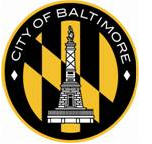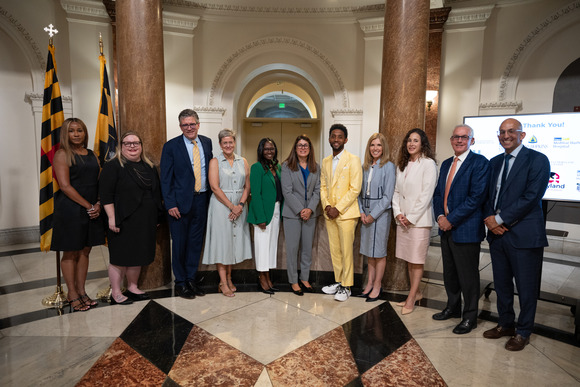City of Baltimore Highlights Statewide Expansion of Maryland's Medicaid Supportive Housing Waiver
Monday Jul 15th, 2024

FOR IMMEDIATE RELEASE
City Applauds Local Hospital Support and Investment In Program To End Homelessness

BALTIMORE, MD (Monday, July 15, 2024) – Today, Mayor Brandon M. Scott, representatives from State and City agencies, local nonprofits, and Baltimore hospitals gathered at Baltimore City Hall to highlight the statewide expansion of FY 2025 funding for the Assistance in Community Integration Services (ACIS) pilot. Thanks to the diligent partnership with Baltimore hospitals who funded the local “match” over that past five years, the program has helped nearly 300 city households to find and sustain housing. Statewide expansion of the program is planned in the coming year.
“Housing is one of our most important, basic needs as human beings – and access to safe and stable housing brings the mental, physical, and emotional security that can have a dramatic impact on other parts of one’s life, including their health,” said Mayor Brandon M. Scott. “I am incredibly proud of the work that has been done by the partners represented at today’s event to assist our work through this program. The work is not over, but together we will continue making strides towards our ultimate goal of eliminating housing insecurity among Baltimore’s most vulnerable residents.’
Program partners include the Mayor’s Office of Homeless Services (MOHS), Health Care for the Homeless, Baltimore City Housing Authority (HABC), the Maryland Department of Health (MDH), the Maryland Department of Housing and Community Development (DHCD) and every Baltimore hospital and health system: the Johns Hopkins Health System (The Johns Hopkins Hospital and Johns Hopkins Bayview Medical Center); the University of Maryland Medical System (the University of Maryland Medical Center Downtown and Midtown campuses); MedStar Health (MedStar Good Samaritan Hospital, MedStar Union Memorial Hospital; and MedStar Harbor Hospital); LifeBridge Health (Sinai Hospital and Grace Medical Center); Mercy Medical Center and Ascension Saint Agnes Hospital.
“I’m thankful for the support at the state level and the tremendous investment from our local hospital partners and the Baltimore City Housing Authority which has aided in the overall success of this pilot over the years,” said MOHS Executive Director Ernestina Simmons. “The provision of case management alongside housing is pivotal if we are committed to making homelessness rare and brief for Maryland residents, and especially as we serve clients that are chronically homeless or in medically vulnerable households.”
The ACIS pilot program, informally known as the Medicaid supportive housing waiver, was created with initial funding secured by the Harry and Jeanette Weinberg Foundation with help from Program Director Amy Kleine to improve the health of Medicaid beneficiaries with chronic health conditions who are experiencing homelessness and frequenting emergency rooms. The program funds intensive supportive services like housing tenancy support, case management, peer support, financial management, and more which are not otherwise reimbursable by Medicaid. While ACIS only funds services and does not pay for housing, the vast majority of participants receive housing vouchers through HABC.
“Though homelessness can appear complex, the solutions are surprisingly simple: affordable housing coupled with the supportive services we all need to find housing and keep it,” said Health Care for the Homeless President & CEO Kevin Lindamood, the ACIS service provider in Baltimore. “The Medicaid supportive housing waiver provides a sustainable funding source for the intensive, wrap-around services needed to support the most vulnerable members of our community in permanent housing. Thanks to this amazing public-private partnership, we’ve gone from pilot to program in just six years.”
The program was implemented six years ago under the leadership of the Mayor’s Office of Homeless Services, when Baltimore became one of four jurisdictions, along with Montgomery, Prince George’s and Cecil Counties, to apply to the State of Maryland for participation in the pilot. State funding was not immediately available for the pilot, so participating jurisdictions had to provide a 50 percent “match” in order to draw down federal funds. In Baltimore, every local hospital and health system provided the resources necessary to cover the local “match.” Over the last six years, the Baltimore program has grown from 100 to 300 households, part of a 900-household statewide pilot. Governor Wes Moore and the Maryland General Assembly fully funded the match in the FY25 state budget, sustaining the current pilot and allowing future stateside expansion.
"We are proud to have provided financial support for the pilot of this critical initiative. As we expected, the pilot ultimately demonstrated that this model had a significant impact on reducing the overall number of hospital visits, including a 19 percent drop in individuals utilizing hospital services, including Emergency Department visits,” said Johns Hopkins Hospital President Redonda Miller. “Most importantly, it demonstrated what we all know to be true – housing is health care, allowing our unhoused neighbors the stability necessary to improve their health status in a dramatic and meaningful way."
A 2023 study by the University of Maryland Baltimore County’s Hilltop Institute found statistically significant reductions in emergency department utilization, hospitalization and hospital readmission.
“The first wealth is health, and housing is completely critical to individuals flourishing. Those without stable shelter and housing stability are affected in many ways – with medical decline being one of those ways,” said HABC President & CEO Janet Abrahams. “Our mission is to create and provide quality affordable housing opportunities, and it has been an incredible collaboration with the Mayor’s Office of Homeless Services to make this happen.”
The City of Baltimore is thankful for the partnership of our local hospitals in providing the “match” for the last five years, which significantly contributed to the escalation of this pilot to program, and we are excited to see how the program flourishes with additional investment on the state and federal level.
For more information about the Assistance in Community Integration Services (ACIS), follow this link to learn more.